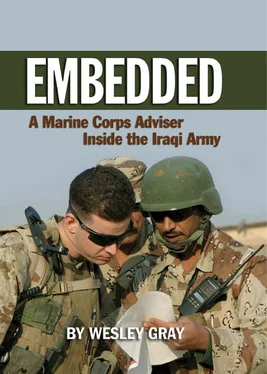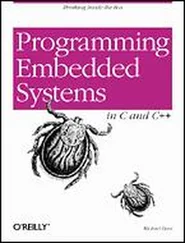“Wait, the Army dudes didn’t stop? Why not?” I asked. “Man, Jamal,” he replied, “I have no idea, but I will hate the U.S. Army for the rest of my life. Anyway, so I had to think fast. I told the lead man, ‘I will shoot my friend.’ I then grabbed Mohammed—who yelled, ‘Sermen, are you fucking crazy?’—and quickly drug him over to my motorcycle so I could grab my pistol. I winked to Mohammed and whispered, ‘one, two…’ I cranked my motorcycle, slammed the accelerator and we peeled out of the scene. Bullets were flying everywhere past us, but none hit us.”
Gasping, I said, “Good God, man. Were you afraid or what?” Sermen peered downward, grasped his Jack Daniels cowboy belt buckle in both hands, and proclaimed, “Naw, it was cool, man!”
After hearing Sermen’s amazing story of survival, he told me more about the situation in Baghdad. “Jamal, I’ll tell you what I think the biggest difference is in Baghdad these days. It is not the Iraqis hatred for each other—this has been around forever and always will. It’s the newfound hatred for Americans. Everyone hates you guys these days: old, young, Sunni, Shia, male, female—everybody. Hell, I have even heard of kids in Baghdad shooting RPGs and AKs at Americans because of the mess you have created.”
I said, “Wait a sec, this is all our fault?” Sermen, a remarkably sensible Iraqi, replied, “You and I both know this is everyone’s fault; however, one thing is true: if America wants to win Iraqis hearts and minds, they need to kill every Iraqi in the country. Then, they need to transplant new people in the area, because I doubt the current society will ever forget the pain and anguish America has put them through. Personally, if I was America, I would just bring in nuclear bombs and kill everyone.”
Typically I took Sermen’s assessments with a grain of salt. I also tried to get other Iraqi opinions on the matter and I talked to the terps to get the update on the sense of the Iraqi people. Unfortunately everyone I’d talked to was singing the same tune. I was even seeing reports in the Triad that validated some of the crazy comments made by Sermen. Recently I’d seen multiple human intelligence reports of little kids carrying guns and helping insurgents conduct attacks in Haqliniyah and Haditha.
It seemed the strategy of “winning over the younger generation” had all but failed. The perception in Iraq was that America was responsible for the chaos, ethnic cleansing, and tribal bloodbaths occurring throughout the country. Our designation as the ultimate scapegoat in Iraq may have laid the foundation for a whole new generation of people that hate our guts. Awesome .
It appeared that with the added children and with those who used to be fence-sitters, the supply of insurgent labor had gone way up. Now that we had effectively pissed off all of Iraq, we had more insurgents who were willing to accept lower wages to conduct terrorist activities. Our policy in Iraq sucked.
My newest neighbors were Salah, Mostafa, Younis, and Qutaiba. All four of these Sunni men were highly educated, English-speaking engineers from Tikrit who were the leaders of the Iraqi construction company that was building new facilities on Camp Ali. To say they had lived tragic lives was an understatement.
Qutaiba invited me into his trailer to speak about his own struggle with the violence in his country. Qutaiba, an elderly man, “not a day over sixty” in his own words, was quite impressive. He was fluent in English and Arabic and conversant in Russian from studying advanced physics. His degrees included a bachelors, a masters, and a Ph.D. in civil engineering from the top universities in Iraq and the Middle East. If Qutaiba had been sent to America and dropped into the professor role at any university, nobody would have been able to distinguish him from any other highly educated university professor. Even so there was one distinguishing feature that made him different from your average university professor: twelve bullet holes in his body.
Qutaiba invited me to sit down. “Jamal,” he said, “we have not spoken much, but I hear you are a legend on this camp.” I replied, “Who told you that? Do you talk to the jundi ? Actually, here is the important question: did people tell you I was legendary in a good way or a bad one?” Qutaiba laughed. “Jamal, it was all bad, my friend. I am sorry.”
After looking with curiosity at Qutaiba’s arm, which was surrounded in a metal contraption with medical pins penetrating his flesh, I had to ask him about it. “Qutaiba, what the heck is on your arm? You look like Robocop.” He replied, “Jamal, are you sure you can handle this story? I know you Marines are squeamish.” I smiled and said, “You think you’re funny, don’t you? Let’s hear your story.”
He went on to tell me his tale. “Jamal, six months ago, a group of men approached my corporate headquarters in Baghdad dressed in U.S. Army camouflage uniforms, spoke fluent English, and told me that they needed to set up a meeting to talk about a future construction job. Because these men were U.S. Army soldiers and I knew they had money, I quickly agreed to meet with the gentlemen, thinking it would be a great way to tap my business into the American money that was rushing into construction projects. The men requested that at the meeting I bring all of my top employees for the discussion. Excited about the opportunity, I agreed to set up a meeting for the following week.”
The old man continued. “The following week the gentlemen I originally met came to my offices at the prescribed time, this time dressed in civilian clothes. Everything seemed perfectly normal. However, the lead U.S. Army soldier had an odd request. He asked me to bring all of my employees outside and put them in a line so they could search them for weapons. I thought this was a fair request, since these men were U.S. Army soldiers. I followed the request and marched all of my employees outside the building and had them form a line.”
Qutaiba looked down and shook his head, obviously saddened by where the story was heading. He raised his head and continued. “Well, Jamal, my fourteen employees and I stood in a single-file line. We felt like we were being set up for an execution. We stood still for five minutes, trying to figure out why the men would not search any of us. Then the lead man commanded, ‘Turn around and face away from us.’ We obliged.” I was stunned by what I was hearing. “We waited for another five minutes,” Qutaiba continued. “I turned around, and to my horror there were five men dressed in U.S. Army fatigues pointing AK-47s and RPK machine guns in our direction. The men transitioned from speaking fluent English and began chanting in fluent Arabic with a Persian accent, ‘Allah akbhar, Allah akbhar.’ [God is great, God is great.] They opened fire on us, mowing us down like weeds. This was not a meeting for business, it was an execution mission set up by sophisticated Iranian terrorists.”
I gasped. “Whoa! How did you survive?” Qutaiba replied, “I am not sure how I survived, Jamal. I felt rounds entering my body multiple times and blood was everywhere. I thought for sure we would all die. The terrorists finally left the scene, assuming everyone was killed. I was the only one still alive. Me, the oldest person in my firm. I crawled back to my office to call for help. Luckily the commotion roused the suspicion of people in the area and people came running to see what had happened. Il hamdu il Allah [Thanks be to God].”
He paused before continuing. “They told my family that I would die, but somehow I made it. I now have twelve bullet holes in my body and for the next two years of my life, I must wear this metal contraption so my arm can function in the future. Pretty wild story, isn’t it?” I was in shock, but was able to respond, “Yes, you could say that.”
Читать дальше












